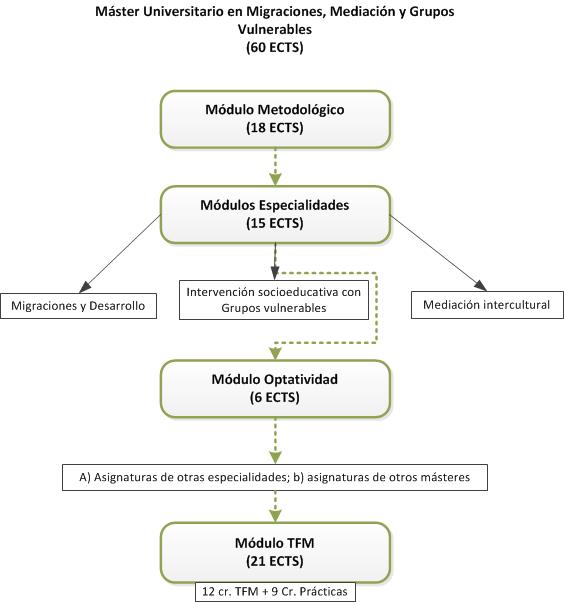Structure and distribution of credits
{{pre.error[0].message}}
{{pre.error[0].message}}
| Course | Basic | Mandatory | Optatives | Curricular internships | End of Studies Dissertation | Total |
|---|---|---|---|---|---|---|
| {{curso}}º | {{c.credects}} | {{c.credects}} | {{c.credects}} | {{c.credects}} | {{c.credects}} | {{creditos | map: 'credects' | toArray | sum}} |
| Total | {{ct.credects}} | {{ct.credects}} | {{ct.credects}} | {{ct.credects}} | {{ct.credects}} | {{cre.creditos_totales | map: 'credects' | toArray | sum}} |
The present proposal of Master's in Migration, Mediation and Vulnerable Groups is organized around a common methodological module of 18 credits, to be developed in the first semester; three specialisation modules, each consisting of five subjects of three credits each, which defines the three specific Master's pathways (Migration and Development, Inter-cultural Mediation, and Socio-Educational Intervention with Vulnerable Groups); and a compulsory Master’s Thesis module, which will comprise internships (9 credits) and master’s thesis (12 credits). The master's degree is completed with six additional credits that are obtained either through two of the three generic electives subjects offered, or through specialisation elective subjects of another pathway. And also through some of the four subjects of other masters of the University of Almeria that have been considered to be directly related to the subject matter of the Master's in Migration, Mediation and Vulnerable Groups.
For more information on the subjects that compose each module, see this link.
In this way, the Master's in Migration, Mediation and Vulnerable Groups can be obtained, in a generic way (by passing seven of the elective subjects offered, in addition to the compulsory ones), or with a mention of the specialisation, when the five elective subjects of that specialisation are successfully completed, in addition to the compulsory subjects and two other elective subjects among those offered.
The specialisation modules allow students to specialize in the specific area they want, but at the same time, taking into account that the topics covered by the master have multiple relationships with each other, it has been considered equally important to give freedom for the student to have choices and flexibility to design a personalized pathway, through the different generic elective subjects, those of other pathways or the related subjects that are taught in other masters.
Thus, to complement the offer of elective subjects of the Master's Degree, and up to a maximum of 6 ECTS, within it, subjects of other verified masters may be offered that have contents and competencies linked to the objectives of this degree. Each year, the Academic Committee of the degree may propose this subject catalogue among the current masters offered by the UAL in compliance with the procedure established by the UAL governing bodies. Initially, as a proposal for the 2018-2019 academic year, the following courses are suggested:
Master’s in Behavioural Sciences Research:
Master’s in Social Communication:
Master's in General Health Psychology:
